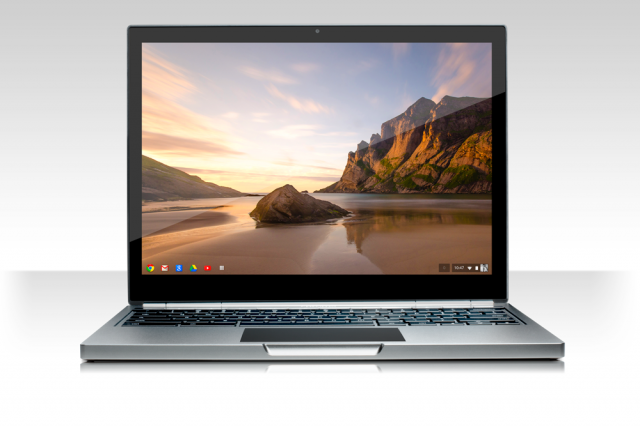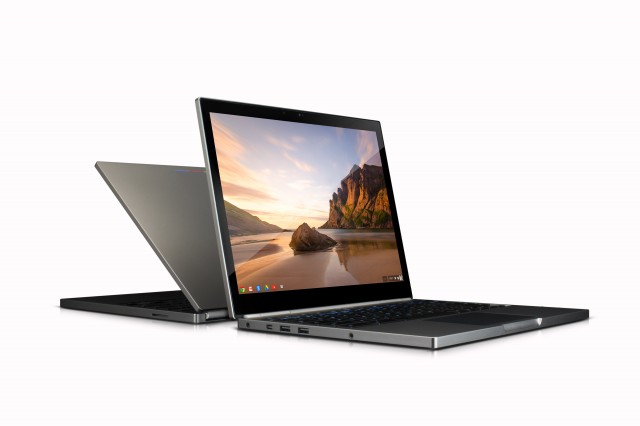
SAN FRANCISCO, CA—Today Google announced the Chromebook Pixel, a touchscreen laptop running Chrome OS. The laptop is meant to be a high-end device "for power users"—as Google made sure to note over and over throughout its presentation.
The Pixel is built by Google, but the company declined to mention the names of the various ODMs it worked with. It comes in a Wi-Fi version for $1,299 or a Verizon LTE-equipped version starting at $1,449 (the latter is US-only). The high price elicited some surprise from reporters, but Sundar Pichai, Google's vice president of Chromebook and Apps, said the company's mission is to build "a Chromebook for everyone," including people who are on their laptops all day—especially photographers.
“Never see another pixel in your life”
The Chromebook Pixel comes with an impressive pedigree of specs—a distinct departure from the $249 Samsung Chromebook announced in October 2012. "We want the computer to disappear for users" Pichai said. “We call it Pixel because we don’t want users to see pixels... you’ll never see another pixel in your life."
While that seems like muddy logic to us, the screen is quite impressive. It's built with Gorilla Glass and measures out a bit longer than most laptop screens at 12.85 inches. Google said it's using a 3:2 aspect ratio rather than the traditional 16:9 or 16:10 to give more vertical height to the touchscreen. "When you think about the Web, the Web has a lot more vertical height because you’re scrolling down. We used 3:2 photographic format to give it about 18 percent more vertical height," Pichai told the crowd.
The screen is high resolution as well, at 2560×1700 with 239 PPI. Google said it has a 178 degree viewing angle and 400 nit brightness, which Pichai claimed was "25 percent more bright than any other laptop screen on the market."

The aluminum-bodied laptop is powered by a 1.8GHz Intel Core i5 processor with integrated graphics, 4GB of RAM, and 32GB of flash storage for the Wi-Fi only model. The LTE model comes with 64GB of flash storage. With the purchase of a Chromebook Pixel, Google said users also get 1TB of Google Drive storage for three years. "The lifetime of the laptop," Pichai noted.
Google engineered the Chromebook Pixel to be sleek and minimalist, hiding the screws, tucking the speakers under the keyboard, even erasing the icons from the ports on the side of the laptop (the company said users identify ports by their shape, rarely looking for the icon). Those ports include two USB 2.0 ports, one mini-DisplayPort, and a 2-in-1 card reader supporting SD and MMC cards.
The laptop also employs three microphones—two in 0.1 millimeter pinholes near the camera and one underneath the keyboard. The two mics near the camera use beam-forming technology to cancel out surrounding noise, and the mic under the keyboard is used to cancel noise from the user no doubt pounding away at the keyboard.
Google said the Chromebook Pixel will deliver "over five hours of battery life." Rest assured we'll have a full review in a few weeks to find out how realistic that is with the processor powering so many pixels.
Chrome OS grows up
Google said it optimized Chrome OS for touchscreen use, and it's working with third-party developers to create applications for the laptop. Kan Liu, product manager at Google, told Ars the company built the laptop's firmware to track users' fingers and react to the keyboard from the ground up—no third parties allowed.
In our limited use, we found the touchscreen to be quite responsive. The screen is drop-dead gorgeous (and at Google's price point, it better be). Google showed the audience demos using swiping through Google Maps, as well as the third-party Pulse app and 500 Px. Besides the three years of 1TB of Drive storage, Google is also offering 24/7 phone support for the laptop in case something breaks.
Whither Chromebook?
"You should think of it as the equivalent of a MacBook Pro," one Google representative said as he was circulating through the crowd after the event. But creating a touchscreen tablet also puts Google in competition with Windows 8 and OEMs making hybrid laptop/tablets with Microsoft's operating system.

The Pixel also pits Chromebooks against Google's tablet hardware like the Nexus 7, which runs on Android, not on Chrome OS. That said, Google executives have stated publicly that pushing Google content—on whatever platform—makes the development of two operating systems and many devices worthwhile for Google.
Earlier this month, Ars reported on widespread rumors of “a fancy new high-end laptop called the 'Chromebook Pixel,' a Chrome OS laptop with a high-resolution 2560×1700 touchscreen.” At the time, the 'Chromebook Pixel' seemed like an outrageous idea to us. The browser-based OS seemed to do better as Google was able to lower hardware prices to a $249 bargain. Indeed, at the event today, Sundar Pichai said the Samsung Chromebook occupied the number one spot every day in Amazon's laptop category since launch. But it appears the company is confident users will buy a high-end device in the league of computers with similar form factors, such as IdeaPad's Yoga 11, which starts at $800.
No comments:
Post a Comment
Let us know your Thoughts and ideas!
Your comment will be deleted if you
Spam , Adv. Or use of bad language!
Try not to! And thank for visiting and for the comment
Keep visiting and spread and share our post !!
Sharing is a kind way of caring!! Thanks again!